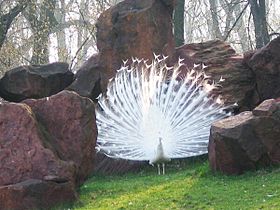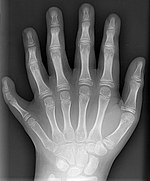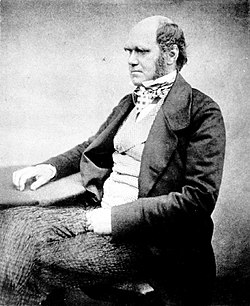Talk:Natural selection
| Workgroup category or categories | Biology Workgroup [Categories OK] |
| Article status | Developing article: beyond a stub, but incomplete |
| Underlinked article? | No |
| Basic cleanup done? | Yes |
| Checklist last edited by | Bill James 16:17, 29 March 2007 (CDT) |
To learn how to fill out this checklist, please see CZ:The Article Checklist.
Plan for Article
This article bears an important relationship to many other articles of the Citizendium pilot. It is probably best updated so that a user can reference it appropriately both from genetic articles at a higher academic level, and hobbyist articles on breeds of animals and varieties of plants on a practical level. Nancy Sculerati MD 08:06, 5 January 2007 (CST)
Natural selection: biology
This article is about natural selection as a biological theory. The wikipedia article, which was very long, also included information theory and social darwinism, as well as evolution. As almost none of what was written about these topics was easily comprehensible, I deleted them. Nancy Sculerati MD 17:02, 5 January 2007 (CST)
- The feeling among many of the WP editors as been that this is the best of the evolution articles, relatively little affected by the continual struggle against intelligent design and unintelligent vandalism. How much further do we drill down until we get to the actual scientific articles? There are many accessible and books about the genetics of individual pet and agricultural animals. I suggest the place for them will be the articles about the individual animals.
- The discussion of the social & philosophical aspects is a summary, and fuller accounts appear several places in WP, and I will try to find them and combine them into a single article, but there should still be a sentence here leading to it. I am not certain about the title.
- The physical aspects, interwoven as they are with Behe's argument based on the second law of thermodynamics, also needs treatment. I think its done fuller elsewhere, and again it should be tracked down. and again I'm not sure about a good title. Again, it should be referred to here. The existing paragraph may have suffered from over-condensation. It may be better to put these in after the article itself has been written.
- The material about history is still included, and I have added the missing subheadings. Probably this too will eventually be a separate articles, but I do not know if we need separate articles on the history of nat.sel., and the history of evolutionary thought.
- I changed the general books to come first, and I do not like called the more advanced ones "technical" To me, 'technical" in a biological setting implies either technique, or the applications, such as agriculture, medicine, and biomedical engineering. That doesn't mean I like "more advanced"--think of it as a place holder. DavidGoodman 18:19, 5 January 2007 (CST)
- I just looked, and the WP article is experiencing further work from some good people. I am collating it tonight to incorporate improvements in ours , and then it will need checking every month or so. We should use good work where we find it. DavidGoodman 18:22, 5 January 2007 (CST)
added from edit
- The feeling among many of the WP editors as been that this is the best of the evolution articles, relatively little affected by the continual struggle against intelligent design and unintelligent vandalism. How much further do we drill down until we get to the actual scientific articles? There are many accessible and books about the genetics of individual pet and agricultural animals. I suggest the place for them will be the articles about the individual animals.
- The discussion of the social & philosophical aspects is a summary, and fuller accounts appear several places in WP, and I will try to find them and combine them into a single article, but there should still be a sentence here leading to it. I am not certain about the title.
- The physical aspects, interwoven as they are with Behe's argument based on the second law of thermodynamics, also needs treatment. I think its done fuller elsewhere, and again it should be tracked down. and again I'm not sure about a good title. Again, it should be referred to here. The existing paragraph may have suffered from over-condensation. It may be better to put these in after the article itself has been written.
- The material about history is still included, and I have added the missing subheadings. Probably this too will eventually be a separate articles, but I do not know if we need separate articles on the history of nat.sel., and the history of evolutionary thought.
- I changed the general books to come first, and I do not like called the more advanced ones "technical" To me, 'technical" in a biological setting implies either technique, or the applications, such as agriculture, medicine, and biomedical engineering. That doesn't mean I like "more advanced"--think of it as a place holder. DavidGoodman 18:19, 5 January 2007 (CST)
- I just looked, and the WP article is experiencing further work from some good people. I am collating it tonight to incorporate improvements in ours , and then it will need checking every month or so. We should use good work where we find it. DavidGoodman 18:22, 5 January 2007 (CST)
Removed during cleanup



Orphaned text
This didn't really fit where it was but I suspect that, with some cleanup, this is useful information. I'm moving it here for correction:
After reading Darwin, Herbert Spencer introduced the term survival of the fittest; this became popular, and Wallace marked up an entire edition of The Origin of Species, replacing every instance of natural selection with Spencer's phrase. Although the phrase is still often used by non-biologists, modern biologists avoid it because it is tautological if fittest is read to mean functionally superior.
Jacob Jensen 22:24, 2 April 2007 (CDT)
Incorrect
Text here was removed by the Constabulary on grounds of civility. (The author may replace this template with an edited version of the original remarks.)
- I've changed it. Not a biologist, so I'll leave the rest alone. I changed it because I didn't understand the previous sentence at all. John Stephenson 04:12, 15 July 2007 (CDT)
Why reverted last sentence of the first par
The last two sentences of the first paragraph now read: "Although there are differing definitions of the term natural selection, most biologists agree that this process is completely verifiable as far as micro-evolution, and a number of biologists hold to a more Darwinian approach involving macro-evolution. Put in a general way, natural selection is thought to explain why all life evolves at some fundamental level." Tom (Major--new guy, welcome Tom) changed the latter sentence to read, "Natural selection is thought to explain how all the varieties within the species originated (ex. all the varieties of dogs)." This completely ignores the previous sentence; the last sentence was a gloss on the second-to-last sentence. --Larry Sanger 10:31, 5 September 2007 (CDT)
- Well, it doesn't disregard it completely, just half of it. The last sentence only covers the micro-evolution view, not the macro. The last sentence was simply mentioning that a number of biologists hold the macro-evolution view of adaptation which eventually develops into brand new features never before seen in the genes, while the natural selection process is not capable of doing that. It only selects from what is available in the genes. Sometimes mutations happen that delete or make more of what is already available, but not brand new, or never-previously-existing, features. :-) --Tom Major 11:00, 5 September 2007 (CDT)
Well, my point is simple: the last sentence explained the fact that some biologists "hold to a more Darwinian approach involving macro-evolution." Let me change the punctuation to make this clearer. --Larry Sanger 11:17, 5 September 2007 (CDT)
Well, (welcome Tom), I've looked at the first paragraph and frankly it had become pretty incomprehensible over time and wrong in places, so I'm not at all surprised that you thought it was worth a tinker. I've rewritten it. Micro and macro evolution are complex concepts that I don't think belong up front.Gareth Leng 11:26, 5 September 2007 (CDT)
- Thank you Dr. Sanger for clarifying, I think I understand now :-).
- Mr. Leng, yes, that first paragraph was getting a little difficult to understand. I thought it was getting a little too open-ended and unspecific. You mentioned that micro/macro might be too complex of subjects to mention up front. However, I could see it as beneficial to note a difference in micro/macro definitions of natural selection at the beginning, because the paragraph/article was already making the assumption of macro-evolution before I changed anything. Which is more dangerous, not to cover micro/macro up front because of the supposed idea that they are too complex of subjects, or to assume one over the other? No offense to yourself, but to put it bluntly, I would see the automatic assumption of macro as indoctrination. I say, let's mention both definitions.
- I like most of the additions and changes since I made mine. Thank you :-). However, I find the following statement troubling. Maybe someone with more expertise can help me out with this.
- "including the origin of all species that have ever existed on earth" (underline added)
- As far as I know, natural selection is not a creative process, at least not the natural selection that is currently observed in the real world. It is rather a selective process. Now, let me define some terms. When I say creative, I am not referring to a mutation that causes mere duplication of existing material, I am referring to the idea that a mutation could come up with new material that did not previously exist. Mutations do not "poof" new things into existence, they rearrange and sometimes delete or multiply information. As an example of what I mean by that...
- Say I go to Papa Johns to get pizza. I am a peculiar creature that happens to find himself in the exotic environment of college life, and needs to adapt to survive. For the example, lets say that the toppings on the Papa Johns pizza are examples of physical traits that are available in the genes of my species. Now I realize from the outset that this is a flawed example, because the animal (myself in the example) would not be choosing the traits/toppings. It is just a process that happens naturally by the death of other creatures that don't have that trait, hence the name. I understand that natural selection does not look ahead at the outcome and I am not trying to say that.
- Anyways, when I go in the Papa Johns and I order a "large with one topping", I can add all kinds of things including pepperonis, mushrooms, sausage, etc. But one thing I will never see as a topping is koolaid. Now, I can have as many pepperonis and mushrooms and sausages as I want, or I could even ask for a pizza without cheese, but I can never ask for something Papa Johns doesn't offer. Maybe even by random chance, the pepperonis will be arranged in a circular and somewhat organized fashion, but it does not constitute a new type of topping that they do not offer.
- Even if by chance a worker spilled koolaid on my pizza, it would be thrown out. Now one might say that it was a beneficial addition to the pizza because it added flavor. However, such a mutated pizza would be a disadvantage, since because of the definition of kool in koolaid, it would no longer be a hot pizza.
- I know some of my fellow students like to eat mutated pizza, but I'm more of a pepperoni and sausage man myself. :-)
- In other words, I have to select from what they (Papa Johns) makes available.
- That is true natural selection. The word in the quote above that troubles me is the word origin. That certainly implies that natural selection is a creative process (ordering koolaid on my pizza when it's not on the menu), when that idea is not observable in the real world. Now, it's ok for the page to mention this theory, but so far that theory has not been demonstrated, and we at the Citizendium would be breaking our neutrality guidelines to assume as fact something that is not seen or demonstrated.
- Sorry for the length of the response. I hope I was able to clarify my concerns in a intelligent way. I am open to other suggestions. :-) --Tom Major 16:35, 5 September 2007 (CDT)
Before we get into anything like a debate, Tom, let me just say two things (other than "Welcome!"). First, you should specify exactly which part of the article that you think needs to be changed. If you don't think the article needs to be changed, or if the point about the article is actually not very important, please continue the discussion on http://forum.citizendium.org/. Second, you're trying much too hard. Ultimately, real biologists are going to make the call, so for their sake :) it's better just to state your argument briefly. --Larry Sanger 16:48, 5 September 2007 (CDT)
- Thanks for forum suggestion. I will start a new post there eventually (this is my last response in this page), with what we have posted here. As far as the article, I would change the entire tone of the article to simply talk about Darwinian definition of Natural selection, rather than assuming it. The only definition of natural selection that can be talked about with any certainty is the one that involves small changes that do not develop new species, because that is the only one observed. I realize I may be outnumbered here in my opinions (especially those people with degrees), but thought it necessary to voice them. It will not be the end of my little world if Editors decide against this way of thinking :-). --Tom Major 18:52, 5 September 2007 (CDT)
Tom, most of the arguments that you bring forward are typical for religious people who doubt the validity of the scientific theory of evolution by means of natural selection. What is clear for me from your essay is that you do not understand how natural selection actually works but rehash claims frequently expressed by creationists and intelligent designers. Your example of Papa Jones Pizza's is exemplary for the misunderstanding of natural selection. Your distinction between micro and macro evolution is one seldom used within biology circles in the way you use it, other than to indicate broad fields of research in which the focus is more on within species versus between species variation, but the mechanism of evolution by means of natural selection are not different. It is however frequently used within creationist/ID circles and focuses on the incorrect claim that mutations are incapable of generating novel variation.
As for the claim related to the origin of all species, that claim is indeed incorrect, as NatSel explains the diversity on earth after life had come into existence. Natural selection is NOT saying anything about that, and if that is presentin the text, it needs to be corrected. Kim van der Linde 16:57, 5 September 2007 (CDT)
- As Dr. Sanger recommended above, I will be moving this to the forum eventually (this is my last response in this page). I did have a few quick things to note here though about your response.
- my arguments are a typical response... Ok, which part was typical? All of it maybe? What if I said your response was typical of evolutionary biologists? How would that change things?
- "who doubt the validity of the scientific theory of evolution": Is that a sacred cow that is not capable of being doubted?
- religiosity... Doesn't have any bearing on this discussion, especially since I didn't bring it up?
- Papa Johns example is a misunderstanding... Great, I'd love to hear how! I'm not just saying that, because I'd genuinely like to improve my knowledge :-). And I know illustrations always fail to completely demonstrate a point, so I'd like to see how you would answer, not the details, but the general message of the pizza example.
- "my" definition of micro/macro is not used in mainstream biological circles... Which circles? Your circles?
- "novel variation". I assume by novel you mean what dictionary.com says "of a new kind; different from anything seen or known before: a novel idea". If you could point me to some examples of what you are thinking (that have stood the test of time and research), I'd be much obliged :-).
- "origin" in article... I'll leave that to you to change it, since we agree on that point.
- Please, if you are going to respond, please respond to my points, not your experiences of people like me. I am probably wrong in the semantics of some things (because I don't have the same kind of degrees as you), but I believe that I am right in my general argument. --Tom Major 18:52, 5 September 2007 (CDT)
- Biology Category Check
- General Category Check
- Category Check
- Advanced Articles
- Nonstub Articles
- Internal Articles
- Biology Advanced Articles
- Biology Nonstub Articles
- Biology Internal Articles
- Developed Articles
- Biology Developed Articles
- Developing Articles
- Biology Developing Articles
- Stub Articles
- Biology Stub Articles
- External Articles
- Biology External Articles
- Biology Underlinked Articles
- Underlinked Articles
- Biology Cleanup
- General Cleanup
- Cleanup